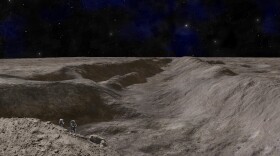-
Scientists are using the Barringer Meteor Crater near Winslow to test equipment that might one day fly to the Moon.
-
The Trump administration cut funding and dismissed staff at the U.S. Global Change Research Program, which releases a Congressionally mandated assessment of climate change every few years. It’s unclear if the program will be revived in the summer legislative budget. Northern Arizona University climate scientist Ted Schuur spoke about the loss of American expertise.
-
"Wearable robots” might sound like science fiction, but a research lab at Northern Arizona University is perfecting an ankle exoskeleton to help people who have trouble walking.
-
Weather permitting, skywatchers in Arizona will be able to see a total lunar eclipse tonight — the first and only “blood moon” of the year.
-
A Senate committee will hold a hearing Thursday on the proposed Fix Our Forests Act, which is aimed at reducing catastrophic wildfires. However, support is mixed.
-
A new study led by the University of Arizona suggests anxiety and post-traumatic stress disorder can have ripple effects on the reproductive health of female firefighters.
-
Colorado River conservation programs have stopped receiving money from the federal government despite temporary restraining orders intended to halt the Trump Administration’s funding freeze.
-
A new study explains how two deep canyons formed very quickly on the moon during an asteroid impact. KNAU’s Melissa Sevigny spoke with local planetary scientist David Kring about the findings.
-
Solar advocates continue to fight what they call a “discriminatory” fee added to the utility bills of Arizona Public Service customers who have solar panels.
-
A new paper coauthored by Northern Arizona University scientists proposes solutions for the decline of the Great Salt Lake in Utah. The lake’s level has dropped about 4 inches a year since the 1990s.

Play Live Radio
Next Up:
0:00
0:00
Available On Air Stations










